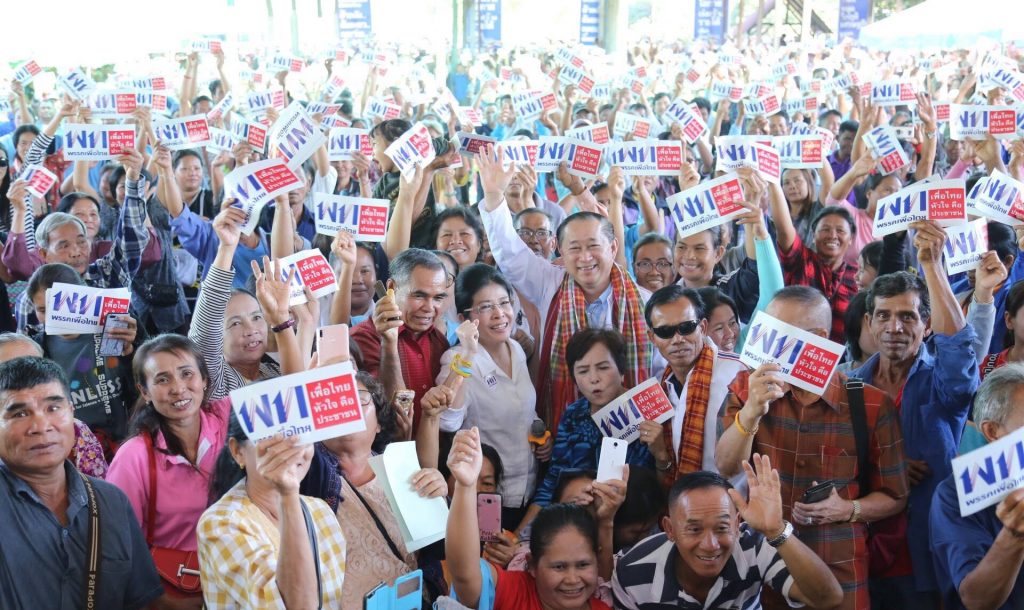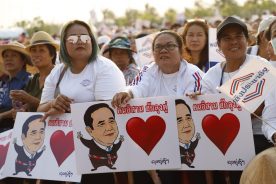While Thailand’s election last Sunday was a tight race between Pheu Thai and Palang Pracharat, Pheu Thai was the clear winner online.
Thailand is among the top 5 most social-media active countries in the world. With 7 million first time voters in the 2019 election, platforms like Facebook became ground zero for winning the hearts and minds of voters. With nearly 60% of the population now online, social media campaigning has become inevitable. How well did key political parties measure up in their social media performance?
Ironically, it was neither the most active nor the most well networked party that won the Facebook election. Instead, it was the least active party which proved the most popular: Pheu Thai, whose supporters mobilised online with little direction from above.

Author’s calculations based on all Facebook activities between 1 November 2018 to 23 March 2019
Each time Pheu Thai made a post, the party garnered nearly 30,000 reactions from fans. This rate of engagement is 450% higher than the second most engaged party, the Future Forward Party, even though the latter has more overall page likes. Both the Democrat Party and Palang Pracharat received 10 times less engagement from users compared to Pheu Thai.
A high level of engagement is not only a metric for content popularity, it also directly impacts Facebook’s algorithm. Having a popular page means that Pheu Thai posts and videos appear on Facebook feeds regardless of whether one likes the party.

Source: Author’s calculations, 1 November 2018 – 23 March 2019
This high rate of engagement from Pheu Thai’s Facebook supporters is in direct contradiction to its campaigning effort. Compared to other political parties, Pheu Thai only posted 230 times between 1 November 2018 and 23 March 2019—the lowest level of posting activity of any key political party, except for Bhum Jai Thai.
Palang Pracharat Party: can old tricks win in a new political landscape?
พรรคพลังประชารัฐ: การเมืองเก่าภายใต้ภูมิทัศน์ใหม่
Content analysis of Pheu Thai’s most popular posts shows that economic issues dominated much of the online discussion. Each time a Pheu Thai post started with “today the economy is in crisis”, it would receive tens of thousands of likes and shares along with tens of thousands of comments narrating how much better off users were under the Thaksin and Yingluck governments. One of the most popular comments said:
I used to be able to afford an entire case of eggs but now I can only buy 20 baht’s worth at a time. The price of rice keeps going up, now we can afford to buy only 5 kilos at a time. If the poll says the economy is improving, you can’t trust it. Come and ask us ordinary folks working in the fields, factories and as street vendors how the economy is doing. Don’t make up the polls… If Pheu Thai becomes the government, the economy will definitely improve.
Perhaps Pheu Thai was right to take the conservative road when it came to social media campaigning and focus its efforts offline instead. Pheu Thai enjoys strong party identification: its supporters associate the party with Thaksin’s political legacies (the 30 baht health care scheme, OTOP, debt relief programs, village funds, the war on drugs). These policies were repeatedly mentioned throughout the tens of thousands of comments on Pheu Thai’s page.
Page networks: Future Forward Party

Meanwhile, Future Forward Party punched above its weight when it came to their social media campaigning. While neither the most active nor the most engaged, Future Forward was the most well networked. Instead of focussing on actively posting as much as possible, the party focused on building grassroots support bases through local chapter pages on Facebook—a smart strategy for a newbie with no established party structure.
The diagram above shows how Future Forward’s main page is connected through provincial party pages such as Future Forward Party Chiang Mai, Future Forward Party Phuket and Future Forward Party Pitsanulok. These pages are then connected through online community groups such as youth groups and fan groups. Because Future Forward’s target demographic leans towards younger Thais—the most social media active group in the country—it makes sense to focus effort on building and strengthening online, grassroots support that can be quickly mobilised. Sustaining and growing the party’s popularity through social media is likely to remain an indispensable strategy for Future Forward.
 Facebook
Facebook  Twitter
Twitter  Soundcloud
Soundcloud  Youtube
Youtube  Rss
Rss 



